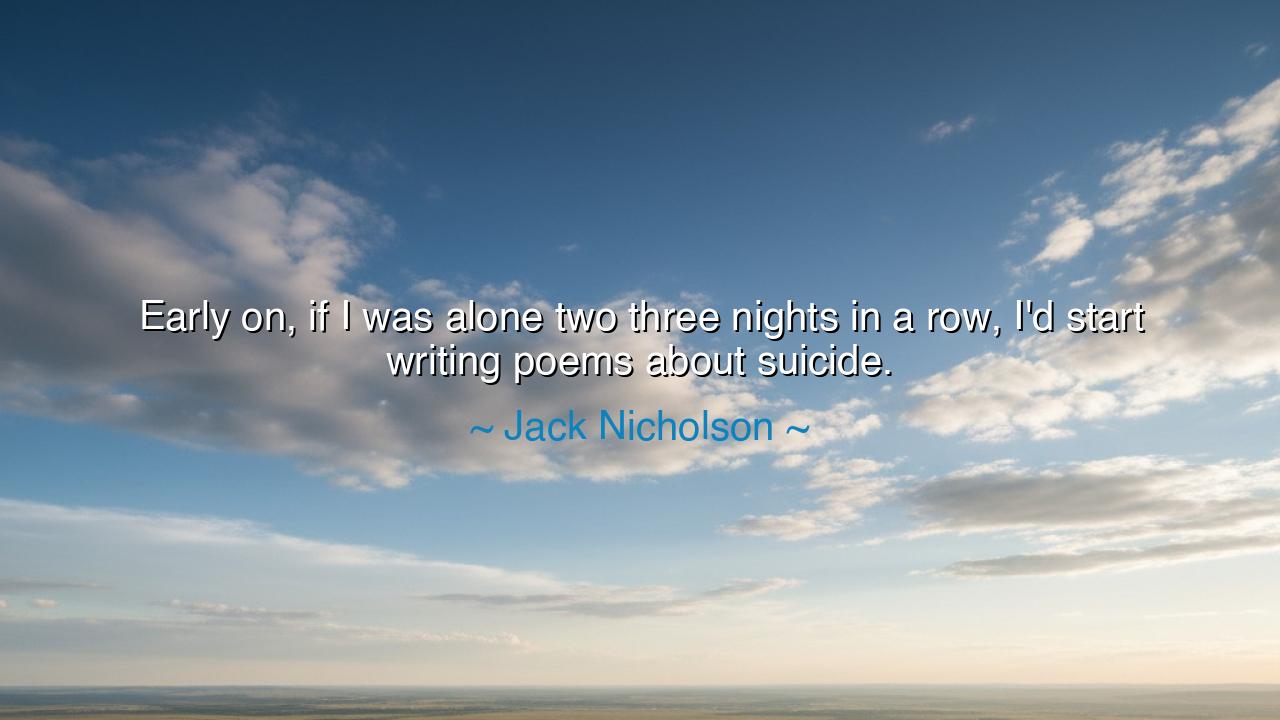
Early on, if I was alone two three nights in a row, I'd start
Early on, if I was alone two three nights in a row, I'd start writing poems about suicide.






“Early on, if I was alone two or three nights in a row, I’d start writing poems about suicide.” — thus confessed Jack Nicholson, the actor of boundless energy and piercing depth, whose face became an emblem of both madness and genius. In these words, spoken with the candor of a man unafraid of his own shadow, there lies a truth as ancient as the soul itself: that solitude, though often the cradle of creation, can also be the echo chamber of despair. Nicholson’s reflection is not merely about fame or loneliness — it is a meditation on the fragile balance between the creative spirit and the human need for connection.
In his youth, before the world knew him as one of cinema’s titans, Nicholson struggled with the inner restlessness that afflicts all artists — that dangerous union of imagination and sensitivity. To be left alone “two or three nights in a row,” as he said, was not simply to be without company; it was to be trapped with the full weight of his own mind. For the artist, silence is never empty. It hums with voices, memories, and the haunting awareness of mortality. In that quiet, he began to write poems about suicide — not necessarily as declarations of intent, but as attempts to wrestle with the darkness, to give shape to what threatened to consume him.
This confession is not weakness but honesty, the kind that only those who have gazed into their own abyss can offer. It reveals a paradox that has long been known to the wise: that isolation can sharpen perception, yet also magnify pain. When the mind, unanchored by the warmth of companionship, turns inward too deeply, it risks becoming a labyrinth with no exit. Nicholson’s words echo the lament of countless souls before him — poets, philosophers, prophets — who found that the same solitude which inspires can also destroy.
Consider Vincent van Gogh, that radiant and tortured artist who painted the sun itself but could not escape his inner night. Alone in his small room in Arles, surrounded by visions too vivid for the world to understand, he too turned to art as a form of survival. His letters to his brother Theo are filled with both gratitude and despair — gratitude for the one person who saw him, and despair at the loneliness that haunted him even in creation. Like Nicholson, Van Gogh used art to transmute his suffering, yet both men remind us that art alone cannot always soothe the ache of disconnection.
In Nicholson’s admission, there is also the quiet recognition of human dependency — that no soul, however strong or gifted, was made to live entirely alone. We are creatures of reflection; we come to know ourselves through the eyes of others. When deprived of that mirror, the mind begins to fracture its own image. His words, then, are not merely about the danger of solitude but the necessity of companionship, of reaching outward when the inner world becomes too vast to bear. In the ancient tales, even the gods sought company — for creation itself is a dialogue, not a monologue.
Yet, it is also true that from this pain comes beauty. Nicholson’s impulse to write, to pour his turmoil into poetry, is a testament to the transformative power of expression. Where silence could have devoured him, words gave him release. Here lies a subtle triumph — that he did not let the darkness have the final word. Through creation, he transmuted despair into meaning, echoing the wisdom of the ancients: that suffering, when expressed, becomes a source of strength, and that what once sought to destroy us can become the foundation of art.
Lesson: Do not fear solitude, but neither should you surrender to it. When loneliness comes, meet it not with silence, but with creation, with connection, with honest expression. Seek others — even one person — who will listen without judgment. And when you must be alone, let your solitude be a workshop, not a prison. Turn your pain into poetry, your silence into song, your despair into something living. For though darkness may visit, it need not dwell forever.
Thus, Jack Nicholson’s words stand as both warning and wisdom — a reminder that the greatest danger to the human spirit is not the world’s noise, but the unchecked silence of the self. He teaches us that even those who seem invincible bear unseen battles, and that the truest strength lies not in denial, but in the courage to speak one’s truth. “If I was alone two or three nights in a row…” — from such loneliness, he found the spark to create, to endure, and to remind us all: art is not the absence of pain, but the redemption of it.






AAdministratorAdministrator
Welcome, honored guests. Please leave a comment, we will respond soon